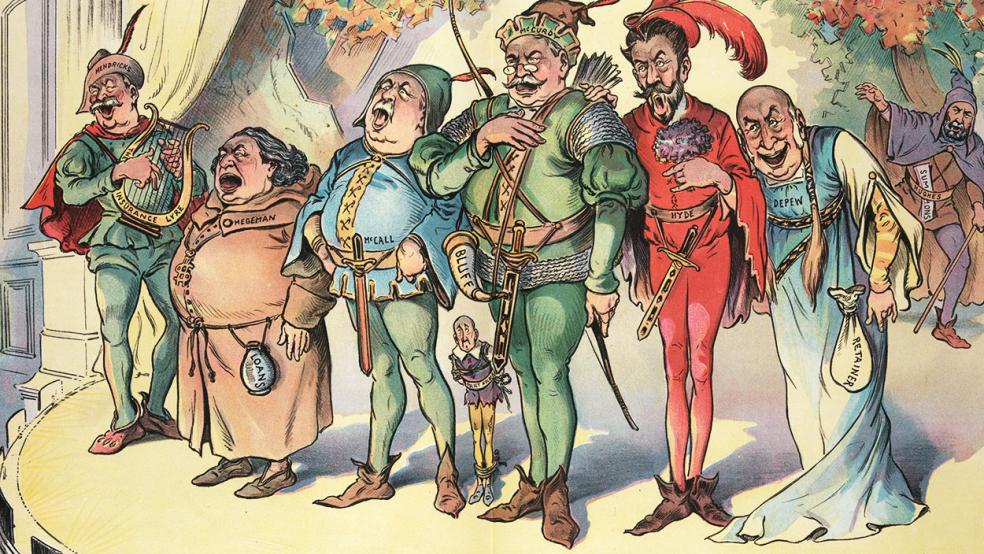Many conservatives have attacked social insurance programs such as Social Security and Obamacare because they redistribute income from the rich to the poor, the young to the old, or from makers to takers. But there is nothing unusual about the fact that insurance programs redistribute income among participants. If they didn’t, it wouldn’t be insurance.
Consider, for example, a case you may not think of as insurance at first, risk pooling in financial markets. Suppose there are 100 individuals, each with $50,000 in savings. This is money they will need to be comfortable in retirement, and although they’d like to loan the money out and earn interest, they are not willing to take the risk that the borrower might default on the loan and cause them to lose everything. So as individuals, they are very unlikely to do anything except put the money into completely safe, no risk alternatives.
Related: Income Inequality is Hobbling the Middle Class
However, by pooling the loan default risk through a bank or other financial intermediary, the risk can be reduced substantially. If, for example, there is a 5 percent loan default rate, then as individuals making the loans 5 percent of the people would lose everything – five people would lose $50,000. But if the $250,000 in losses is distributed across all 100 individuals, everyone can still get all their money back plus interest. Nobody loses anything.
This is precisely what financial markets do. By pooling all of the funds together and loaning out the $5,000,000 at, say, an interest rate of 10 percent, the interest earnings would be $475,000, more than enough to cover the $250,000 in losses from default. Everyone would earn $2,250 on their $50,000, a return of 4.5 percent.
The result of risk pooling is a redistribution of income relative to the case where the loans are made individually. The 95 people who made good loans receive a lower return than they would under risk pooling, and of course the 5 people who would have lost everything – those who receive the interest that would have gone to the 95 “winners” – are the beneficiaries of this redistribution of income.
However, and this is a point that is often overlooked in these discussions, the 95 people who gave up interest to cover the losses got something in return for these “insurance payments”. Nobody knows for sure in advance who would have lost everything, and risk pooling provides everyone with a service, protection from losing his or her life savings. The lower interest that they receive on the loans is a payment for this service.
Related: GOP Austerity Budget Plans Risk a 2014 Defeat
This is what insurance does. It pools risk and distributes the losses across the participants in the program. Fire insurance, for example, pools the contributions of participants, and when somebody experiences a loss from fire the money is redistributed from those who did not have a fire to those who did. Everyone understands that the fees they pay provide this protection, and they don’t object when the pooled contributions are redistributed to cover losses.
Social insurance programs are fundamentally the same. When we start out in life, nobody knows for sure who will end up unhealthy, or poor in old age. So we pool the risk of this happening in programs such as Social Security and health insurance, and there is subsequent redistribution from those who do well in life to the less fortunate.
Why do people object to social insurance programs if they are just like fire insurance and other forms of risk pooling?
There are several reasons. First, because there are significant market failures that interfere with the efficient provision of social insurance by the private sector, these are by necessity government run programs. Many people who object to government involvement in these programs do not understand the market failures, or they do not agree – despite evidence to the contrary – that the market failures are significant enough to require the government to intervene in these markets.
Related: Obama Hears a Big No on Cutting Entitlements
Second, they may not believe that the programs are actuarially fair, i.e. many people believe that they contribute too much to, say, a program like Social Security relative to the risk that they will be impoverished, and those extra payments get unfairly redistributed to other people. But, as explained in the next paragraph, all things considered the redistribution is not as large as many people believe.
Third, and I think most important, is the maker-taker view of the world. According to this view, for the most part the lower income and unemployed households who rely upon these programs, or the elderly with no savings and no means of support, are in dire straights due to their own choices and poor morals. If they were as virtuous as the makers were, they wouldn’t need to rely upon others for help.
However, when you take account of all of the entitlement programs and all of the provisions in the tax code that benefit those households who are doing well, then as Jared Bernstein says, “All told, clearly some redistribution here but not anything that would lead to stark divisions between ‘makers and takers.’”
The claim from the right that social insurance moves income from one person to another is true. But that’s not a bug, that’s a feature. The only way insurance of any kind can work is by redistributing funds from the fortunate to the unfortunate, and the mere fact that such redistribution occurs is not a reason to object to social insurance programs.
Top Reads from The Fiscal Times:






